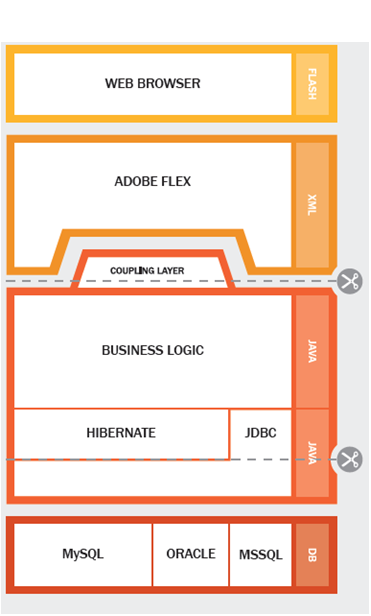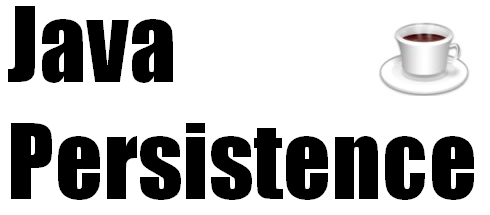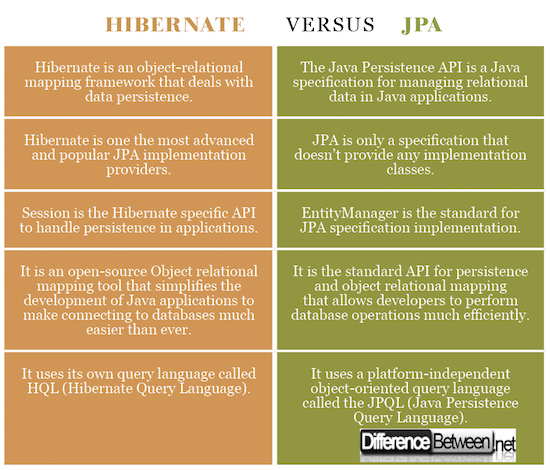Difference between Hibernate and JPA
Java applications traditionally used technologies like JDBC (Java Database Connectivity) to access relational databases in order to store data persistently. The main problem was the difference between object-oriented and relational technologies. JDBC API would require developers to hand-code the most primitive CRUD (create, read, update, and delete) operations in SQL which lacked portability.
Additionally, the code was totally SQL dependent which is not a standard specification for relational databases, which would make the transition from one database to another more difficult. The problem is relational technology is focused on data and its relationship, whereas the object-oriented paradigm emphasizes not just on data but also operations performed on it. This results in the object-relational impedance mismatch. One solution that’s widely accepted is object-relational mapping (ORM).
What is Hibernate?
Hibernate is an ORM (Object/Relational Mapping) framework for the Java programming language that is concerned with data persistence. It simply is an open-source object-relational mapping solution that maps Java classes to database tables in relational databases and from Java to SQL data types. It is a lightweight ORM framework distributed under GNU license that aim to provide developers with a transparent mechanism to achieve persistence. It uses a powerful query language similar to the SQL called the HQL (short for Hibernate Query Language), which swiftly integrates with both existing and new applications without changing the rest of the application. Plus, it is fully compliant with object-oriented notions like inheritance, polymorphism, and association. And the best part, it does not require you to modify the application class to achieve persistence.
What is JPA?
The Java Persistence API, or JPA, is a specification that describes the interface for the object-relational mappings and persistent object management. Beyond the API definition, it defines the set of rules and guidelines on how to implement the object relational mapping and how to make these specifications compliant with all the JPA providers. Hibernate is the most advanced and widely used ORM implementation of JPA guidelines. JPA simply provides the object/relational mapping platform for managing data between Java objects/classes and a relational database in Java applications. It’s an interface specification designed for the JPA implementation vendors to create a standard for ORM implementation in order to target high-performance data access layer requirements. Hibernate is the most popular JPA vendor.
Difference between Hibernate and JPA
Basics of Hibernate and JPA
JPA, short for Java Persistence API, is a specification for accessing, managing and persisting data in applications using Java Platform, Standard Edition (Java, SE) and Java Platform, Enterprise Edition (Java, EE). Hibernate, on the other hand, is more of a tool for ORM implementation that is compliant with JPA specifications.
Purpose of Hibernate and JPA
JPA is a specification for object-relational mapping in Java that allows developers to perform database operations much faster and efficiently thereby allowing for easy interaction with databases. It is the standard API for persistence and object relational mapping providing several advantages to the developers for data-binding operations. Hibernate is an open-source Object relational mapping tool that simplifies the development of Java applications to make connecting to databases much easier than ever.
Dependability of Hibernate and JPA
The problem with JPA is that it’s just a specification which doesn’t provide any implementation classes. The API is just a collection of classes and methods to store data persistently into a database following a specific set of rules and regulations that are to be followed by JPA vendors. Hibernate is one of the many JPA implementation vendors that implements JPA specification in any environment supporting JPA including Java SE and Java EE application servers.
Features in Hibernate and JPA
Besides being the most popular JPA implementation vendor, Hibernate framework retains its native API for promoting backward compatibility as well as accommodating no-standard features. Hibernate comes with several features that are not supported by the Java Persistence API such as extended identifier generators, new Date and Time API, repeatable annotations, steam query results, customizable CRUD statements, immutable entities, natural IDs support, ad hoc join of unrelated entities, etc.
EntityManager vs. Session
EntityManager is the standard for JPA specification implementation which is same across all implementations. On the contrary, if you want to use Hibernate API, then you would use Hibernate specific Session to handle persistence. However, you will not be able to migrate to a new vendor if you choose to use Session because it’s limited to Hibernate APIs.
Hibernate vs. JPA: Comparison Chart
Summary of Hibernate vs. JPA
Almost all enterprise applications need some way to store data persistently. It’s vital to enterprise applications because of the required access to relational databases. Persistence is a fundamental concept in application development and is a challenge in itself because of the need to serialize the hierarchically structured Java objects to a database in a way that is both fast and efficient. While persistence has already been a hot topic of discussion in the Java community, many developers won’t even agree on the scope of the problem. In the context of object-oriented language, persistence means the data is still accessible even after the process which created it has ended. There are many ways to store data persistently. Hibernate is one such project that aims to provide a complete solution to the problem of persistence in Java, whereas JPA is a specification for managing persistent data and object-relational mappings.
- Difference Between Caucus and Primary - June 18, 2024
- Difference Between PPO and POS - May 30, 2024
- Difference Between RFID and NFC - May 28, 2024
Search DifferenceBetween.net :
2 Comments
Leave a Response
References :
[0]Image credit: https://commons.wikimedia.org/wiki/File:TriDoc_Technology.png#/media/File:TriDoc_Technology.png
[1]Image credit: https://commons.wikimedia.org/wiki/File:Java-persistence.PNG#/media/File:Java-persistence.PNG
[2]Konda, Madhusudhan. Just Spring Data Access. Sebastopol: O’Reilly Media, 2012. Print
[3]Keith, Mike, Merrick Schincariol, and Massimo Nardone. Pro JPA 2 in Java EE 8. NYC: Apress, 2018. Print
[4]Linwood, Jeff and Dave Minter. Beginning Hibernate. NYC: Apress, 2010. Print
[5]Elliott, James. Hibernate: A Developer’s Notebook. Sebastopol: O’Reilly Media, 2004. Print




If you think, “we’re not likely to move away from Hibernate, so JPA isn’t important for us,” then think again.
There are substantial differences between Hibernate 3.6 and Hibernate 4. There are even significant differences between Hibernate 5.1 and 5.2. Every time you upgrade, you’re effectively switching to a new persistence provider. By using a more stable interface like JPA, you can make upgrades much smoother.
It’s worth noting that Hibernate is often months, if not years, ahead of the JPA spec in terms of new functionality. It took forever for JPA to include JODA time. Hibernate had it in a very early release.
Use JPA, yes. But sometimes it’s incredibly helpful to dig into the HibernateSession and gain access to pieces of functionality that JPA simply doesn’t yet provide.